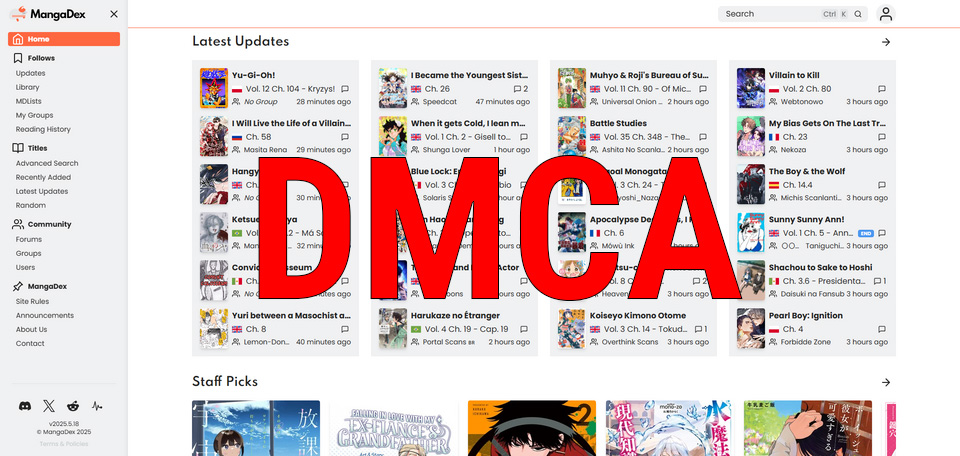
MangaDex, one of the largest fan-run platforms for reading manga, is in hot water after they received a massive DMCA takedown notice. The takedown notice affects more than 700 manga titles and came from anti-piracy company, RemoveYourMedia, at the behest of the largest companies in the manga industry: Viz Media and Shueisha.
The breadth of the takedown is concerning to many in the online manga community. MangaDex said English and non-English scanlations (the latter many of which have never been officially released outside of Japan) were deleted in response to the request. The notice has sparked discussions about access to manga, copyright, and fan translations as a way to promote manga culture outside of Japan.
What Happened?
On May 17, 2024, MangaDex posted an announcement that they received a DMCA notice and as a result had to take down 738 titles from their website due to copyright claims. The notification forms part of a broader publisher crackdown on the unauthorized distribution of manga works on the internet.
Many of the manga cited in the notice do not have official English licenses (or licenses in any language other than Japanese), which has led to questions why these takedowns are legally justifiable and the rationale behind the companies undertaking the takedown. Supporters of fan translations have argued that many scanlation groups provide translations that fill in gaps left by publishers who are slow or unmotivated to license a particular title for release in English.
Who submitted the takedown? The DMCA notice was submitted by RemoveYourMedia, a noted facilitator of digital copyright protection. They have a history of similar takedown notices targeting anime and manga sites. This time, they submitted the notice against MangaDex on behalf of Shueisha (the publisher of One Piece, Jujutsu Kaisen and many more) and Viz Media (which publishes many Shueisha works in English).
While these companies have every right to protect their intellectual property, the scope of the takedown has raised eyebrows across the board. Some of the removed manga are obscure and niche manga series with no defined licensing plans outside of Japan.
What Did MangaDex Say
MangaDex reported that they complied with the takedown notice in order to avoid a potentially protracted legal battle, but they were clearly frustrated by the notice. They highlighted that MangaDex does not host official releases and that the site is entirely non-profit – most content on the site is from fan groups who donate their time and translate manga for international readers.
They reminded users that they are still committed to supporting the scanlation community and preserving manga that may otherwise be lost to geography or time. They did caution users and uploaders to be vigilant, as this might indicate a future wave of enforcement from copyright holders.
Why This All Matters
This incident is not an isolated case, but rather a part of a larger trend within the manga and anime industry. As Japanese publishers extend to international markets and streaming services continue to grow in popularity, companies are becoming increasingly protective of their content.
For fans, this is bittersweet. On the one hand, it shows that publishers are spending money and resources to reach these markets, possibly meaning official translations will come sooner. On the other hand, the crack-down on scanlations will, by nature, take away access to many authors and works that we wouldn’t know otherwise, especially for non-english speakers.
The Big Picture
The scanlation culture has always existed in a gray area – (technically illegal), but largely tolerated due to its grassroots nature and role in growing the popularity of manga internationally. For years, sites like MangaDex have let readers discover gems of manga that were otherwise unavailable.
As the industry looks to expand into a corporate model, with legal recourse in place of the grassroots approach, more fan-driven projects face greater scrutiny. The future of scanlations and sites like MangaDex are uncertain – and more takedowns mean we may not know what happens next.